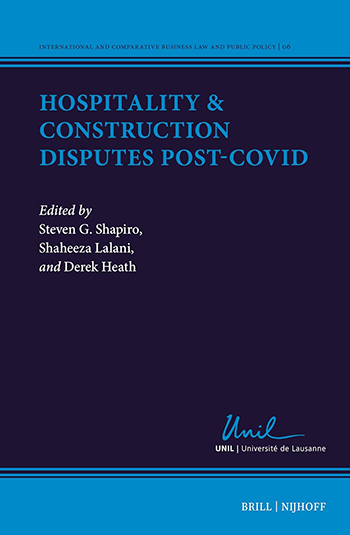CLInt – Book Review – November 2024
Monday 25 November 2024

Hospitality & Construction Disputes Post-Covid
Edited by Steven G Shapiro, Shaheeza Lalani and Derek Heath
Published by: Brill Nijhoff
ISBN: 9789004514867
254 pages, €160
Publication date: 20 November 2023
Reviewed by Thayananthan Baskaran
This book is a collection of 11 essays on disputes arising in the hospitality and construction industry in the wake of the Covid-19 pandemic. The book is divided into two parts. The first, comprising six essays, is focused on the hospitality industry. The second, comprising five essays, looks at the construction industry. To review this book, I have looked at an essay in each part.
The fourth essay in Part 1 is entitled ‘Navigating Hotel Management Agreements in Times of Crisis’. The authors begin by setting out the elements of hotel management agreements, and explaining their purpose and nature. The authors then highlight the clauses that become focal points during times of crisis.
The authors then focus on force majeure and frustration claims, which are particularly significant in light of the Covid-19 pandemic. The authors consider the challenges posed by general force majeure clauses that may not specifically address events like pandemics, leading to potential disputes over their enforceability. The authors explore the differences in interpretation of force majeure provisions across common and civil law jurisdictions, emphasising the need for parties to carefully consider the governing law of their agreements.
The first essay in Part 2 is entitled ‘Abeyance to Resuscitation – Construction Arbitration in the Post-Covid Era’. The authors begin by explaining the diverse lockdown measures implemented in various countries, shedding light on how construction projects were compelled to navigate stringent social distancing rules and screening protocols to resume operations.
Next, the authors explore legal remedies such as change in law clauses, adaptation mechanisms, hardship clauses, and force majeure provisions commonly found in construction contracts. The authors consider the application and effectiveness of these clauses.
The authors also consider the challenges associated with interpreting and invoking these contractual provisions. The authors look at the nuances of change in law clauses, particularly in distinguishing between binding legal restrictions and non-binding guidelines imposed by governments during the pandemic.
In conclusion, this book provides invaluable insights into navigating legal challenges in the hospitality and construction industries post Covid-19. Each chapter offers a comprehensive analysis of the legal frameworks, contractual obligations and practical challenges faced by stakeholders. By highlighting deficiencies in current practices and advocating for proactive measures to address unforeseen events, this book serves as an indispensable resource for industry professionals, scholars and legal practitioners.
